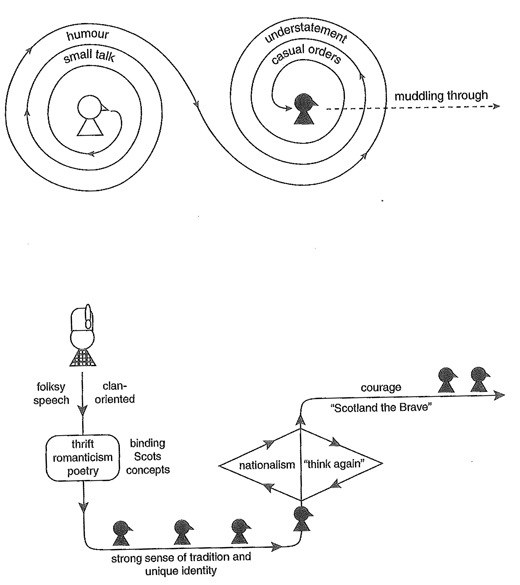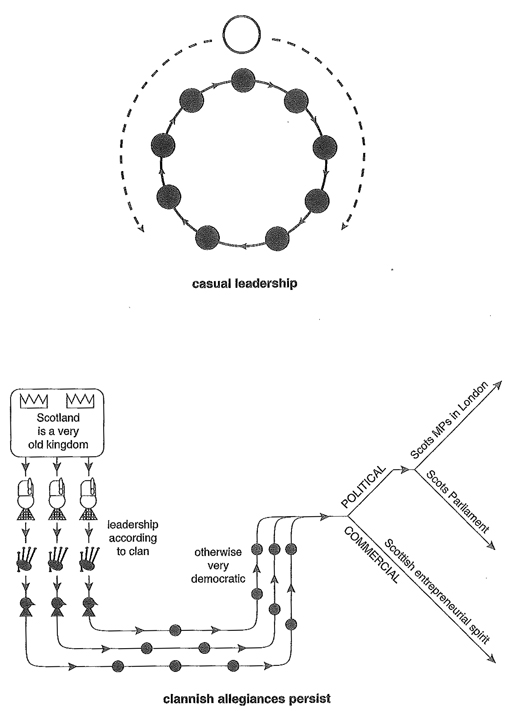The months-long debate and analysis of the referendum concerning possible Scottish secession seemingly centres on class disparities between underprivileged, nationalistic Scots and a complacent, over-privileged, Westminster-directed elite often referred to as the “Establishment”. It is an easily discernible classification not necessarily closely-bound to the dictums of the Labour and Conservative parties.
It is no secret that the United Kingdom, since the social stress of the unfolding of the Industrial Revolution, has been a polarized society, unable up to now to rid itself of class questions that have been dealt with successfully in the 4 Scandinavian countries and to a lesser extent in Canada, Australia, New Zealand and the United States. The divisions in British society are, however, not merely dual, but clearly multiple. It is worth noting, therefore, that the Scottish referendum was seen in a different light, perhaps felt in a more visceral manner, in separate regions of Britain and particularly the North. We are talking about the heavily-populated northern heartlands of Lancashire, Yorkshire and the North-East. During the campaign, the question was often, “Who are the Scots?” Perhaps even more pertinent to this dispute is the question, “Who are the English?”
For decades the British film industry, enriched by the talents of such actors as Alec Guinness, Peter O’Toole, John Gielgud, Ralph Richardson, Alastair Sim, George Cole and Charles Laughton, have put him on the screen for the world to see. The BBC, in such admirable programmes as “Upstairs Downstairs”, “Yes, Minister” and “Downton Abbey”, has reinforced the image.

[These diagrams show how English and Scotish managers address their staff in very different ways.]
The Englishman dresses in tweeds or a three-piece pin-striped suit and a Burberry mackintosh on rainy days. He wears a bowler hat, carries a tightly furled, black umbrella with a cane handle, has a pink newspaper tucked under his left armpit. He goes to church on Sunday mornings and eats roast beef with Yorkshire pudding for Sunday lunch. He is a man of principle, insists on fair play for underdogs, does things in a proper manner and shows more affection for horses, cats and dogs than for children, foxes and grouse. He probably went to Eton and Oxford (Cambridge?) and frequents Ascot, Wimbledon, Twickenham, Lord’s and Wentworth. He believes in the Monarchy, the Empire and the Conservative Party. When not in his Club (no ladies allowed) he sits in the local (pub) with gardeners and game wardens, with whom he sips warm beer called ‘real ale’. Often he has tea with the vicar, with whom he discusses the Church of England, farming, poaching, the village fête and his years with the Guards.
Englishmen are fond of cricket, croquet, rugby, sheepdog trials, detective stories and queuing. When queues are slow, one does not complain, as English people must never make a scene, not even if they have a doublebarrelled name. The same applies to poor service in restaurants, railway stations and that place where you get your passport.
The antidote to such frustrating situations is the stiff upper lip. When queuing or sitting in a train one does not enter into conversation with others – that is the reason for carrying a newspaper everywhere. When a train was derailed in a tunnel in the London Underground a few years ago, an elderly City gentleman walked half a mile down the line to the next station, where he proclaimed: ‘It’s horrible down there in the dark. People are talking to each other!’
This powerful stereotype of the British character has been etched on other nations’ minds by several generations of British films. Huge populations abroad, including the Japanese, Indians, South-East Asians and Africans, still subscribe to it and send their children to Britain to be educated along the same lines.

[These diagrams show how English and Scottish managers lead in diverse ways.]
The majority of British people bear little resemblence to the stereotype. Not only is the image one of an upper class personage of a former era, but it does not take into account regional differences, which in the UK are extremely marked. If you draw a latitudinal line through the city of Oxford, it is questionable if you will find anyone north of it who behaves in the manner of the stereotype. In the first place, nearly 10 million Britons are Celts (Scots, Welsh, Irish, Cornish and Manx). These people are essentially romantic, poetic and emotional. They, like millions of midland and northern English people in the ‘wilds’ beyond Oxford, are extremely critical of the archetypal Englishman existing in foreign minds. There is a type of English person who roughly corresponds to the projected image, but he is southern, upper class and almost extinct! Even in the south, we are talking about a tiny, although often highly visible (and audible) fraction of society. Foreigners, often laughing at the eccentric English stereotype, are unaware that 50-odd million Britons laugh at him too. Northern, midland and Celtic Britons feel much more affinity with some Europeans (Norwegians, BRITAIN 179 Danes, Swedes, Finns, Dutch, Belgians, Germans, Swiss) than they do with the braying figure in tweeds. Britons are supposed to be poor at learning languages – this is a myth. Scots, Welsh, Irish and most people north of Watford learn foreign languages well and often with a good accent.
What are real English people like? The ‘world image’ bears some resemblance to the reality, but not much. The class system is still in evidence in Britain – an unfortunate anachronism which North America and most of Europe have dispensed with – but in fact most British people could be called middle class. They do not have a strong political party to represent them, although both Conservatives and Labour eagerly pretend to do so. The absence of a moderate centrist party contributes, sadly, to the continuing polarisation of British society.
Polarised or not, how do British people behave? Whatever the status, a pattern can be observed. Yes, we are a nation of queuers and probably the only time British people complain vociferously is when someone jumps the queue. But the stiff upper lip can move – British people today hold nothing sacred. While royalty is respected, the Royal Family is often ridiculed, both in the press and on TV. If the British can laugh at themselves, so can the monarchs – what could be more democratic than that?
Humour is a saving factor in British life – some say it is a product of a fickle climate – and many English people feel that as long as there is humour, there can never be utter despair. It is no accident that the BBC – the most humorous television service in the world – is highly popular in most countries fortunate enough to be able to receive it.
It is true that British people love detective stories. Agatha Christie is the world’s most translated novelist and the British easily lead the world in library book loans. Sherlock Holmes is one of the most famous and popular Englishmen of all time. The fact is, the British have a strong conspiratorial streak – they love plotting. The most beloved characters in the extensive British theatrical literature are villains. Guy Fawkes, who was hanged after failing to blow up Parliament, became an instant hero and the nation still celebrates his anniversary every 5 November. The biggest heroes of British naval history were Francis Drake and John Hawkins – both pirates. Apparently polished and sophisticated in diplomacy, the British are masters of intelligence gathering and political blackmail.
If we come back to the North – a fairly clearly defined region or even concept in British life (by contrast, there is no clear South) – there is little doubt that the proposed ‘Yes’ campaign found greater sympathy in the North than in England as a whole. As we have discussed above, inhabitants of the North identify much more easily with Scots aspirations and characteristics, than do peole who live south of Oxford. Apart from the century-old struggle for better living conditions, higher wages and more regional say, people in Lancashire and Yorkshire feel they share the following traits with their cousins north of the border. They are straighforwardness, hard-headedness, taciturnity, modesty, under-statement, inventiveness, thrift, cosiness, friendliness, frankness, simplicity, openness, fidelity, reserve and sense of fair play. Moreover, they consider themselves less diplomatic, less snobbish, less casual, less flippant, use less coded speech and are certainly less patrician than southerners.
This self-image of a reasonable, yet clearly focussed, sporty English Northener seems mirrored to a large extent in a kind of cultural Northern Dimension with our close European neighbours in colder climes – Norwegians, Swedes, Danes, Finns, Icelanders. Scots, both mainland and insular (Orkneys, Shetland, Hebrides), clearly fit into this rather close-knit, democratic dimension. The sea-route from Newcastle to Bergen is short, and well-travelled for centuries. The Vikings bequeathed more influence than they perhaps are aware of in Northern Britain.
It remains to be seen to what extent the impetus and excitement of the Scottish Referendum will stir up aspirations and demands in diverse English regions, not to mention Wales and Northern Ireland.
Post Tags:
